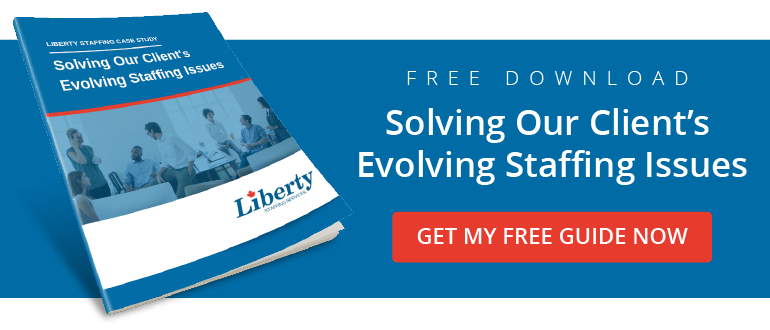 There may not be a requirement to conduct exit interviews of offboarding employees, but we highly recommend it! Exit interviews can provide you with invaluable insights into your operations, management, and more.
There may not be a requirement to conduct exit interviews of offboarding employees, but we highly recommend it! Exit interviews can provide you with invaluable insights into your operations, management, and more.
Have you said goodbye to some of your staff recently and need to find new hires? Liberty Staffing Services helps Southern Ontario’s businesses fully staff their operations. Connect with us today to make sure you don’t spend any time understaffed.
Exit interviews have to be done carefully if they are going to be useful. Let’s take a look at some best practices for conducting them, and then 8 great questions you should ask.
Best Practices for Conducting Exit Interviews
The goal of exit interviews is to find out what is going well (and what’s not going well) at your company. You can learn a lot about employee satisfaction levels, collect any loaner equipment or property, find out about management issues, and understand why your employee is departing.
Ideally, exit interviews will be conducted by a neutral third party, rather than an employee’s supervisor. This promotes authenticity because the outgoing employee is more likely to be candid with a neutral party.
If you can’t outsource your exit interviews, you should have someone from outside of the employee’s direct reporting line conduct the interview.
If you want real answers and insights, you also have to do everything you can to make the exit interview confidential. The interviewer should assure the offboarding employee that their identifying information will be removed from the feedback as much as possible. One of the best ways to do this is to have the interviewer provide collective data, rather than reports on each departing employee.
In addition to asking questions during the interview, this is a great opportunity for departing employees to ask their own questions. You should use this time to confirm any legal obligations that the employee may need to follow.
The 8 Best Questions to Ask in an Exit Interview
Let’s get to it! These are the 8 questions you should ask in your interview.
1. What prompted your decision to leave the company?
This is perhaps one of the most important pieces of information you can collect: why are they leaving? Don’t automatically assume it's because the employee is unhappy. People leave jobs for all kinds of reasons, including the needs of their families, their retirement plans, major life events, and moving.
If something in the workplace has had a direct impact on the person’s decision to leave, it is important to find out what that is! This question is a great conversation starter, which will help you see which direction the conversation should go next.
2. What would have kept you from making the decision to leave?
Would the person have stayed if they had been offered a higher salary? What if their schedule had been different? If they had been able to change from one department to another? Had more growth opportunities?
You may also learn that there is nothing you could have done because the circumstances for their departure were beyond your control.
3. What were some of the best and worst parts of your job?
This is a relatively easy question for most employees to answer. When you ask this question of multiple employees, you get a really good picture of what is working well at your business and what’s not.
4. Were you supported by your manager?
Use this question to find out about the strengths and weaknesses of your leadership team. Look for trends in the answers, especially concerning organization-wide management issues. You can use the information from this question to provide additional training and support to your company’s managers.
5. What skills did you use the most while working here?
Asking this will help you determine if you need to make any changes to your job descriptions, job listings, or training processes. If it turns out that the employee used very different skills than they expected to based on the job description, that is valuable information! You are more likely to retain employees who feel like they are doing the job they were hired to do.
6. What made you feel valued and important to our company? Were there any times when you felt like you were not appreciated?
Did you realize that employee recognition is one of the most important indicators of employee retention? When employees feel undervalued and unrecognized, they leave. It is as simple as that. Find out how you are succeeding – and struggling – to recognize your employees’ hard work.
7. How can we improve as a company?
Candid feedback from exiting employees is one of the best places to find strong strategies for improvement in all areas of your company, from leadership and operations to technology and automation.
8. Is there anything else you would like to share with us?
Ending with an open-ended question provides you with an excellent opportunity to get feedback on issues you never thought to ask about.
Do You Need New Team Members? Liberty Staffing Can Find Them for You!
Liberty Staffing Services has been helping companies in Southern Ontario find exceptional job candidates for 24 years. We know what to look for in candidates across a wide range of industries – and most importantly, we know how to find them!
Let us do the hard work of staffing your business so that you can focus on growth. Contact Liberty Staffing today.


